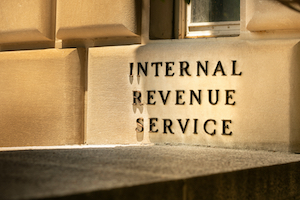 The top leaders of the IRS Tax Exempt & Government Entities (TE/GE) office have outlined their broad plan for fiscal year 2023, which they say will focus on service and enforcement.
The top leaders of the IRS Tax Exempt & Government Entities (TE/GE) office have outlined their broad plan for fiscal year 2023, which they say will focus on service and enforcement.
TE/GE Commissioner Edward Killen and Deputy Commissioner Robert Choi in their announcement about TE/GE plans write that “Fiscal year 2023 promises to be the start of a transformational process for the IRS.” TE/GE, they say, in FY 2023 will focus on implementation of the Inflation Reduction Act, which allocates approximately $80 billion to the IRS during the next 10 years, as well as aligning its activities with the IRS Strategic Plan FY 2022-2026 and its four strategic goals: service, enforcement, people and transformation.
Service. “Providing excellent service to our stakeholders remains our priority,” say Killen and Choi. As such, they seek to “ensure that taxpayers have a positive experience supported by professional, timely, and effective interactions.”
This effort will include assessing the results of the Employee Plans pre-exam compliance program pilot as to the effectiveness in reducing taxpayer burdens, and efficiencies in resolving non-compliance, and continuing to promote the use of digital communications to taxpayers and representatives.
Enforcement. Killen and Choi outlined the backdrop for TE/GE enforcement activities. They plan to use “the most appropriate compliance workstream,” including educational letters, compliance checks or exams, but they seek to balance taxpayer burden with effective enforcement of tax laws.
TE/GE also says it will remain as steadfastly committed as ever to “using data to select the most appropriate returns for compliance action” and that inter-departmental cooperation “remains a top priority in selecting and examining returns for compliance action.”
Enforcement-related goals include:
- Employ the issue-scoring model to develop issues submitted in the Issue Portal for potential compliance strategies.
- Monitor and evaluate the case work on compliance strategies in process.
- Collaborate with the cross-BOD team to develop a unified compliance plan for FY 2024.
- Collaborate across IRS on existing and emerging issues, including, but not limited to, examinations of high income/high wealth individuals.
- Expand the use of data, machine learning, and artificial intelligence algorithms to select returns for exam.
Workforce. IRS, that is. Killen and Choi note that TE/GE hired 187 new employees in FY 2022, and they expect to exceed that number of new hires next year. They also want to improve the environment and work experience for new and existing TE/GE staff.
Transformation. “It goes without saying that we have gone through a constantly changing and transformational environment in the last 2½ years,” Killen and Choi say. Consequently, they seek to have the TE/GE “remain resilient and adaptable” and say that “The next few years will require greater flexibility and resilience” from their office staff.
- Log in to post comments
